Trump - Crisis, What Crisis?

The BBC's Jon Sopel reports on the grim death toll in America from Coronavirus and Donald Trump's journey from boasting 'We've shut it down' to the tragic loss of more than 100,000 lives.
https://www.bbc.co.uk/news/world-us-canada-52775216
Coronavirus: From 'We've shut it down' to 100,000 US dead

By Jon Sopel - BBC
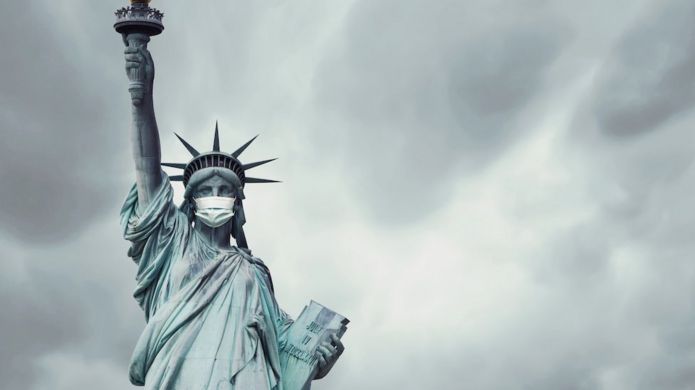 Image copyright - GETTY IMAGES
Image copyright - GETTY IMAGESIt's an uncanny and almost tragically perfect piece of symmetry.
The number of US servicemen and women killed in Korea, Vietnam, Iraq and Afghanistan - over an aggregate 44 years of fighting is almost exactly the same as the number of Americans who've now lost their lives to coronavirus in just three months of America's war against the hidden enemy, as Donald Trump likes to refer to Covid-19.
He also calls it the Chinese virus, but we'll come to that.
Now I know you could replace the Covid-19 deaths with US cancer deaths or road crash victims and come up with similarly stark or perhaps even more dramatic statistics. But sadly, fatal automobile accidents and terminal tumours have always been with us. A global pandemic has not. And out of nowhere 100,000 American families are this spring mourning loved ones, whose lives have been cut short by this virus. 1.5m Americans have been infected. Many millions more have lost their jobs.
One of Donald Trump's first acts when he moved into the Oval Office in 2017, was to restore to a central position the bust of Winston Churchill that Barack Obama had moved out in favour of a bronze of Martin Luther King Jr.
And in this fight against coronavirus, Donald Trump does see himself as a war leader; the property tycoon who could work a shovel on a Manhattan building site was also going to be shown to be a man of destiny - the untried field-marshal, with a baton in his knapsack ready to command the troops to get the job done. But also keeping the home fires burning, and lifting the morale of a frightened nation. It has all been far more jagged than that.
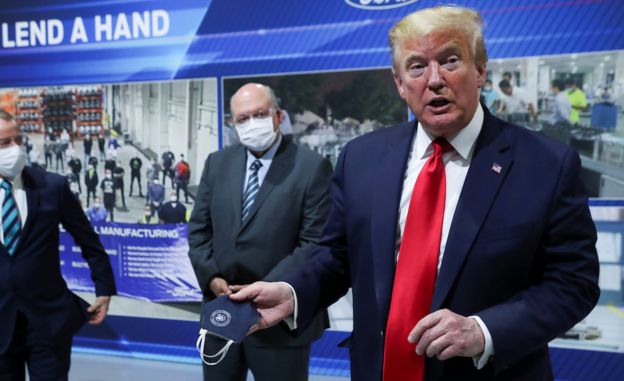 Image copyright - REUTERS Image caption - Trump tours a Ford automobile factory
Image copyright - REUTERS Image caption - Trump tours a Ford automobile factoryDonald Trump is not imbued with the gift of soaring Churchillian rhetoric; there have been no "we shall fight them on the beaches" moments. Nor has he conjured the Rooseveltian calm when delivering one of his fireside chats. There have been days of infamy, but they have been invariably generated by things that the president has said, rather than what has been done to the United States.
And anyway, for a self-styled war leader he must at least face the charge of ignoring the warnings about the enemy he was confronting in the early stages, appearing more Neville Chamberlain than Winston Churchill.
US deaths in conflict:
Korean War (1950-1953): 36,500
Vietnam War (1961-1975): 58,000
Iraq War (2003-2011): 4,500
Afghanistan (2001-today): 2,000
Covid-19 (Feb 2020- today): 100,000
The initial period of the US effort against the virus was marked by one significant action in late January, when the president stopped non-American visitors from China entering the United States. That was smart and decisive (although some have argued, to my mind unfairly, that Trump should have stopped anyone and everyone coming from China). But any tactical advantage that had given the administration was squandered in February where there was a month of inaction and incompetence.
Attempts to roll out testing were woeful (the president was badly let down by the Centers for Disease Control). Procurement of PPE was weak. The federal emergency stockpile of vital equipment was like Old Mother Hubbard's cupboard: bare. The president had also disbanded the entire global-health-security unit of the National Security Council. He also eliminated the US government's $30m (£23m) Complex Crises Fund. These were decisions that badly undermined the American ability to counter the disease.
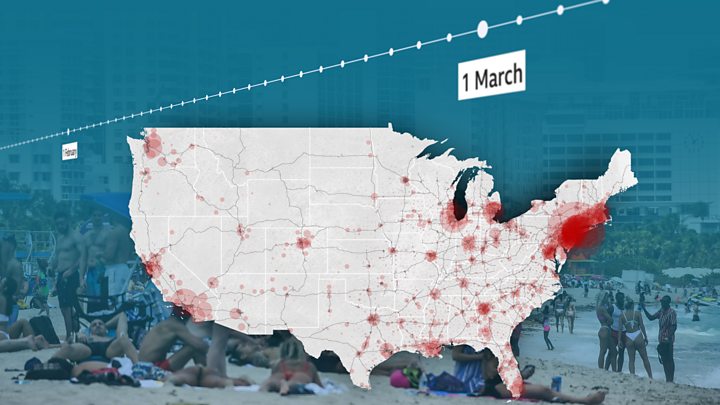
Media caption - The lost six weeks when the US failed to control the virus
All while he was on a determined mission to tell America that this thing from China was no biggie, and certainly was not going to upend the economy - the centrepiece of his strategy for re-election in November.
It is worth just going through the president's quotes from these critical few weeks.
Jan 22: "It's one person coming in from China and we have it under control. It's going to be just fine."
Feb 2: "We pretty much shut it down coming in from China."
Feb 10: "Looks like by April, you know, in theory, when it gets a little warmer, it miraculously goes away. I hope that's true. But we're doing great in our country. China, I spoke with President Xi, and they're working very, very hard. And I think it's going to all work out fine."
Feb 11: "In our country, we only have, basically, 12 cases and most of those people are recovering and some cases fully recovered. So it's actually less."
Feb 24: "The coronavirus is very much under control in the USA. We are in contact with everyone and all relevant countries. CDC and World Health have been working hard and very smart. Stock market starting to look very good to me!"
Feb 26: "When you have 15 people, and the 15 within a couple of days is going to be down to close to zero, that's a pretty good job we've done."
Crisis? What crisis?
But in March the contours became clearer, and it was not pretty. The news was all grim. Because of a lack of testing, there had been extensive community transmission - people were coming down with coronavirus, but it wasn't clear where they'd contracted it, who they'd caught it from, how they'd got it. The "track and trace" (the language of coronavirus that we've all now become so familiar with) was now impossible.
Although the first reported outbreak was out on the West Coast in Washington state, Covid-19 was playing a mean sleight of hand on us all. This pesky virus got us to look in one direction, when we really should have been focused on the other. Where Covid-19 was really letting rip was on the East Coast, especially in the biggest, richest and most densely populated city in the US, New York, with devastating consequences.
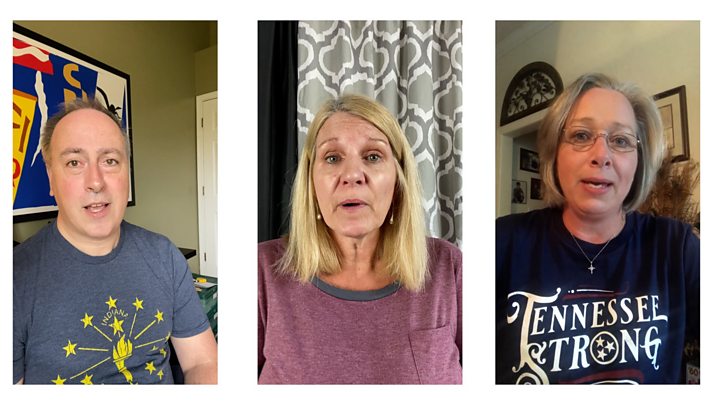 Media caption - What Trump voters think of his handling of the virus outbreak
Media caption - What Trump voters think of his handling of the virus outbreak
If the city was quickly to become the most worrying centre of the outbreak, the borough of Queens became the epicentre of the epicentre - the district where Donald Trump had grown up. And the visuals from there drove home to Americans - and to the president - the scale of the unfolding disaster. At Elmhurst Hospital, refrigerated container lorries were parked to store bodies that the morgue had no way of dealing with. I interviewed a young doctor from there at the height of the pandemic who painted a harrowing picture of daily life and death.
In the richest city of the wealthiest country on the planet, we saw nurses heading into intensive care units to treat Covid patients wearing bin liners as PPE, because that is all they had. We saw the ER consultant putting on his ski goggles to examine a patient, because the hospital didn't have the right face masks. We saw mass graves being dug on a small island in the Bronx to accommodate all those who'd died with no next of kin, or with no money for a funeral. Like the inscription on the tomb of the unknown soldiers in the Commonwealth war graves: "known unto God".
America, this all-mighty superpower, with enough weaponry to blow the planet to smithereens many times over, was looking ragged and not in control of events in its own backyard. It's hard to see this chapter of America's story going as another moment of this nation's greatness.
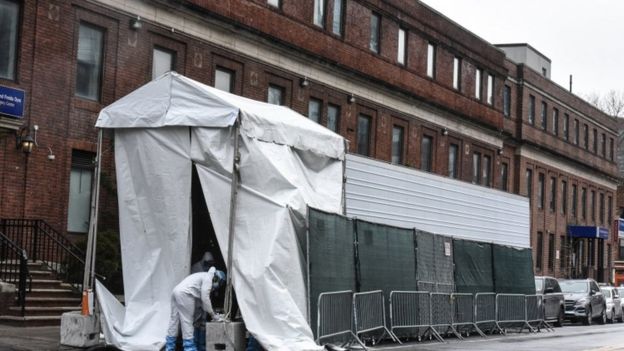 Image copyright - GETTY IMAGES Image caption - Refrigerator lorries are being used as makeshift mortuaries in New York
Image copyright - GETTY IMAGES Image caption - Refrigerator lorries are being used as makeshift mortuaries in New York
If Queens is where Donald Trump grew up, Manhattan is where he made his money - and nothing says money like Wall Street - this is the pulse oxygen monitor of the US economy. And the president likes to stand over its bed to take its vitals hourly. But as it became clear that the US economy was going to have to shut down, so the Dow Jones index went diving downwards - vertiginous drops, causing circuit-breakers to kick in, and causing the president and his advisors to fret that his whole re-election strategy had gone up in flames.
But then the precipitous falls would be followed by dizzying rises as word came from Capitol Hill that lawmakers might be close to some agreement to inject gazillions into the cryogenically frozen economy.
More than 25,000 of the deaths have come from New York, and New York's governor, Andrew Cuomo became coronavirus's first political superstar. His daily factual and highly detailed presentation of what was happening, where it was happening, what was being done to mitigate, and what still needed to be done became appointment to-view television across the US. Cometh the hour and all that.
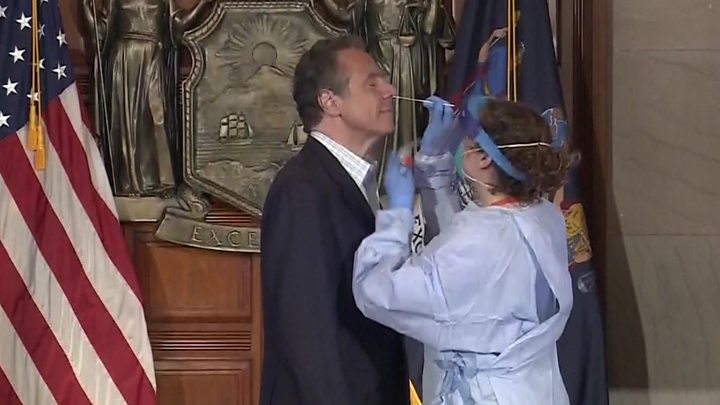
Media caption - New York Governor Andrew Cuomo takes coronavirus test live on TV
This lifelong Democrat - who also grew up in Queens - was drawing admiring glances from a lot of Republicans, and with many Democrats quietly thinking "I wish he was our candidate for president in November, and not Joe Biden". Like an old-fashioned newspaper, he delineated clearly what was fact and what was opinion. In the space of 45 highly polished minutes he would deliver the news stories of New York's descent into the abyss, and then give you his op-ed column. He admitted his response wasn't perfect, acknowledging he could have acted earlier. And he also gave praise to Donald Trump where he thought it was due; he tweaked the tail of the administration when he thought it needed a bit of a kicking.
At around the same time as Cuomo was capturing the nation's attention, Donald Trump decided he would go daily with a White House briefing too. It is hard to overstate how much Donald Trump loves - and needs - the roar of the crowd. Governing is dull. Campaigning - and the adoration from his rallies - is what gives him energy. It's what gets his heart pumping and the blood circulating.
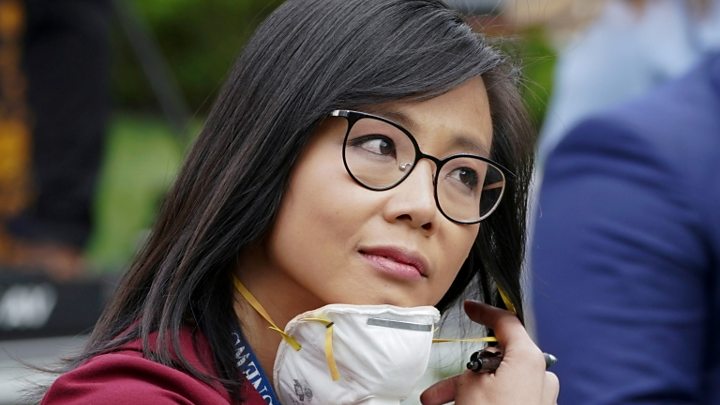
Media caption - Trump gets in spat with Asian American reporter over "nasty question"
And because of the lockdown, here was a president who was deprived of the two things he yearns for most - a day out playing golf, and an evening rally addressing raucous, loving crowds. There were also no heads of states visiting him, where the cameras would record his thoughts on whatever was the subject du jour. He was being starved of the oxygen of publicity, and so daily to the briefing room he would come, with us reporters playing the most unlikely role as his ventilator. Being intubated to a bunch of journalists he's never trusted was never going to end well.
The vice president, Mike Pence, had been given the task of heading the coronavirus taskforce. A poison chalice it may have been, but it's a task he's performed with aplomb. He is across the detail of everything, and was the perfect link-person between the different branches of government and the White House; between the different branches of government and the governors of the 50 states. And two other things he did with considerable deftness. He never forgot to praise the president to the hilt, saluting him for his leadership. Woe betide you if you don't. And he never forgets to display empathy - talking about the suffering of the American people, expressing condolences to those who'd lost loved ones. That is something that came easily to Pence and is something Donald Trump hardly ever does.
Though there would be a revolving cast of characters in the briefing room - the two other stalwarts were Dr Anthony Fauci, the independent minded head of the National Institute of Allergy and Infectious Diseases, and Dr Deborah Birx, who used to head the fight against AIDS for the Obama administration,and was made the coronavirus response coordinator. These were the scientists who wanted to ensure that the judgements the president made were evidence based. They had limited success.
But the impetus to reopen became overwhelming. The jobless totals were soaring, and Donald Trump saw his 'strong economy' election strategy disappearing down the plug-hole.
And all the while the death toll was mounting, ever, ever higher. What started as a trickle at the end of February became a gradual flow. The gradual flow then became a steady stream. And by late April the stream, a torrent.
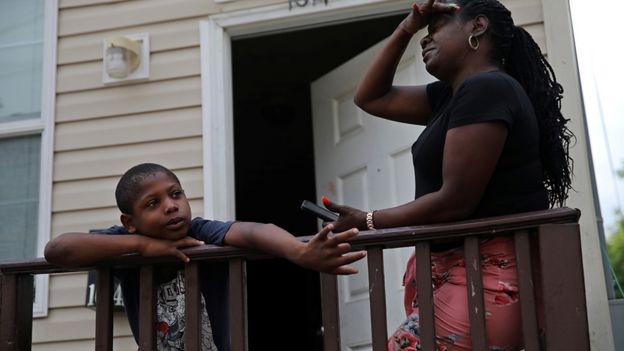 Image copyright - REUTERS Image caption - African American communities in New Orleans have been hit hard
Image copyright - REUTERS Image caption - African American communities in New Orleans have been hit hard
Coronavirus was indiscriminating who it infected; but selective with who it killed. The statistics were striking - if you were black or Latino you were much more likely to die. Longstanding health inequalities came to the fore. If you'd grown up in an impoverished background you were more likely to have the pre-existing conditions - the co-morbidities, as they say in the US - that would prove so deadly with coronavirus: hypertension, diabetes, obesity, heart disease. And if you live in densely packed, multi-generational households, and work in factories or meat-packing plants where social distancing is impossible, then - surprise, surprise - you're more likely to contract the disease.
Why has the virus hit African Americans so hard?
The untold story of America's biggest outbreak
The US Surgeon General, Admiral Jerome Adams - himself African American - addressed this directly, and spoke powerfully about it. But he seemed to pay a price for doing so - he was not seen again at another White House news conference. Someone must have taken exception to what he said.
The president's own erratic performances at these briefings were coming to be seen as counter-productive by Republican strategists. The president's poll numbers were going down. I was at a couple of the most extraordinary briefings. There was the one where the president made it all about himself. His staff had produced a lengthy campaign style video detailing how brilliantly he'd handled the outbreak - for the first 45 minutes of this over two-hour long news conference, Donald Trump spoke about himself. He spoke about how unfair the media was to him. It was "poor me". Not once in those first 45 minutes did he talk about those who'd died, nor about those who'd been infected. Not about the millions who were fretting about how they were going to pay the bills having lost their jobs.
I was also at the briefing where the president spoke about injecting disinfectant to treat coronavirus. Dr Birx, who was sitting at the side of the briefing room, looked like she was in some kind of gastric agony as she listened to the president, but never felt she had the space to stand up and say "this is dangerous nonsense". His performance was lampooned and ridiculed.
But as the criticism piled up against the president, so Donald Trump bristled.
And there were two culprits who'd be forced onto the perp walk of shame. The first was China. Despite his early praise for President Xi, China was now in Donald Trump's cross-hairs. China had lied and covered up. This was the Wuhan flu, the city where the outbreak originated. The Chinese had taken actions to protect themselves, but not anyone else. Worse still in Donald Trump's eyes, China had intimidated the World Health Organisation, and its weak, pusillanimous leadership had allowed itself to be cowed by Beijing, and therefore had failed to warn the world sufficiently of the dangers that this new strain of virus presented. In this, sure, there was blame shifting - but President Trump had a point - both about shortcomings of the WHO, and the candour of the Chinese leadership.
A public health emergency, with a virus that is no respecter of whether you are a Democrat or Republican, Trump lover or Trump hater had divided and bitterly polarised the country. Like everything else.
If you want the country to reopen you're with Trump (broadly); if you're wary about reopening too soon you're a Dem (broadly). If you love the fact that the president has ignored the advice of the Food and Drug Administration over the dangers of hydroxychloroquine, and decided to take it anyway, then you are firmly in his camp.
And although the president has publicly stated that everyone ought to wear a mask, the fact that he chooses not to, is taken as a clear dog-whistle to his supporters that you really don't have to. In the face - so to speak - of all medical advice, the mask is being seen by some as an act of provocation, a symbol of the nanny state.
Shopkeepers who insist that customers wear a mask are being intimidated by thuggish gangs, patrolling outside their premises. It is grotesque. They are being ripped up and destroyed as though a symbol of oppression by the deep state, rather than a small effort to halt the spread of the disease. Our film crews have been jostled and abused for wearing face masks while filming these protestors. Needless to say, these people are no respecters of social distancing.
And now that America has reached this grim milestone of 100,000 dead, what of the future?
In public opinion there does seem to be a battle going on between head versus heart. Science pitted against gut instinct. The role of the state against the rights of the individual.
If a phone app that can track and trace your movements is the vital tool to prevent a second wave of the virus, it relies on a sizeable majority of the population handing over their personal data for it to be effective. Will that happen? In a country whose founding fathers fretted about the dangers of the state becoming too mighty, I just cannot see it (and this goes far wider than pro and anti-Trump). And what if, please God, an effective vaccine is found? You can be sure that the anti-vaxx brigade (and remember Donald Trump was once one of its advocates) will be out in force, stirring up doubts about the science, the medicine, the state, big brother, you name it.
Donald Trump has boasted repeatedly in the past couple of months that no country has done more coronavirus testing that then USA. "It's not even close," he says. No country has built more ventilators or supplied so much PPE to its front-line workers, he says. The president has claimed that other world leaders are jealous of what the US has managed to achieve. Really? Germany, South Korea, Taiwan, Australia, New Zealand, Greece envious?
Hard to believe somehow.
No country has had more deaths, more infections. And that too, so far, is not even close.
Korean War (1950-1953): 36,500
Vietnam War (1961-1975): 58,000
Iraq War (2003-2011): 4,500
Afghanistan (2001-today): 2,000
Covid-19 (Feb 2020- today): 100,000
The initial period of the US effort against the virus was marked by one significant action in late January, when the president stopped non-American visitors from China entering the United States. That was smart and decisive (although some have argued, to my mind unfairly, that Trump should have stopped anyone and everyone coming from China). But any tactical advantage that had given the administration was squandered in February where there was a month of inaction and incompetence.
Attempts to roll out testing were woeful (the president was badly let down by the Centers for Disease Control). Procurement of PPE was weak. The federal emergency stockpile of vital equipment was like Old Mother Hubbard's cupboard: bare. The president had also disbanded the entire global-health-security unit of the National Security Council. He also eliminated the US government's $30m (£23m) Complex Crises Fund. These were decisions that badly undermined the American ability to counter the disease.

Media caption - The lost six weeks when the US failed to control the virus
All while he was on a determined mission to tell America that this thing from China was no biggie, and certainly was not going to upend the economy - the centrepiece of his strategy for re-election in November.
It is worth just going through the president's quotes from these critical few weeks.
Jan 22: "It's one person coming in from China and we have it under control. It's going to be just fine."
Feb 2: "We pretty much shut it down coming in from China."
Feb 10: "Looks like by April, you know, in theory, when it gets a little warmer, it miraculously goes away. I hope that's true. But we're doing great in our country. China, I spoke with President Xi, and they're working very, very hard. And I think it's going to all work out fine."
Feb 11: "In our country, we only have, basically, 12 cases and most of those people are recovering and some cases fully recovered. So it's actually less."
Feb 24: "The coronavirus is very much under control in the USA. We are in contact with everyone and all relevant countries. CDC and World Health have been working hard and very smart. Stock market starting to look very good to me!"
Feb 26: "When you have 15 people, and the 15 within a couple of days is going to be down to close to zero, that's a pretty good job we've done."
Crisis? What crisis?
But in March the contours became clearer, and it was not pretty. The news was all grim. Because of a lack of testing, there had been extensive community transmission - people were coming down with coronavirus, but it wasn't clear where they'd contracted it, who they'd caught it from, how they'd got it. The "track and trace" (the language of coronavirus that we've all now become so familiar with) was now impossible.
Although the first reported outbreak was out on the West Coast in Washington state, Covid-19 was playing a mean sleight of hand on us all. This pesky virus got us to look in one direction, when we really should have been focused on the other. Where Covid-19 was really letting rip was on the East Coast, especially in the biggest, richest and most densely populated city in the US, New York, with devastating consequences.
 Media caption - What Trump voters think of his handling of the virus outbreak
Media caption - What Trump voters think of his handling of the virus outbreakIf the city was quickly to become the most worrying centre of the outbreak, the borough of Queens became the epicentre of the epicentre - the district where Donald Trump had grown up. And the visuals from there drove home to Americans - and to the president - the scale of the unfolding disaster. At Elmhurst Hospital, refrigerated container lorries were parked to store bodies that the morgue had no way of dealing with. I interviewed a young doctor from there at the height of the pandemic who painted a harrowing picture of daily life and death.
In the richest city of the wealthiest country on the planet, we saw nurses heading into intensive care units to treat Covid patients wearing bin liners as PPE, because that is all they had. We saw the ER consultant putting on his ski goggles to examine a patient, because the hospital didn't have the right face masks. We saw mass graves being dug on a small island in the Bronx to accommodate all those who'd died with no next of kin, or with no money for a funeral. Like the inscription on the tomb of the unknown soldiers in the Commonwealth war graves: "known unto God".
America, this all-mighty superpower, with enough weaponry to blow the planet to smithereens many times over, was looking ragged and not in control of events in its own backyard. It's hard to see this chapter of America's story going as another moment of this nation's greatness.
 Image copyright - GETTY IMAGES Image caption - Refrigerator lorries are being used as makeshift mortuaries in New York
Image copyright - GETTY IMAGES Image caption - Refrigerator lorries are being used as makeshift mortuaries in New YorkIf Queens is where Donald Trump grew up, Manhattan is where he made his money - and nothing says money like Wall Street - this is the pulse oxygen monitor of the US economy. And the president likes to stand over its bed to take its vitals hourly. But as it became clear that the US economy was going to have to shut down, so the Dow Jones index went diving downwards - vertiginous drops, causing circuit-breakers to kick in, and causing the president and his advisors to fret that his whole re-election strategy had gone up in flames.
But then the precipitous falls would be followed by dizzying rises as word came from Capitol Hill that lawmakers might be close to some agreement to inject gazillions into the cryogenically frozen economy.
More than 25,000 of the deaths have come from New York, and New York's governor, Andrew Cuomo became coronavirus's first political superstar. His daily factual and highly detailed presentation of what was happening, where it was happening, what was being done to mitigate, and what still needed to be done became appointment to-view television across the US. Cometh the hour and all that.

Media caption - New York Governor Andrew Cuomo takes coronavirus test live on TV
This lifelong Democrat - who also grew up in Queens - was drawing admiring glances from a lot of Republicans, and with many Democrats quietly thinking "I wish he was our candidate for president in November, and not Joe Biden". Like an old-fashioned newspaper, he delineated clearly what was fact and what was opinion. In the space of 45 highly polished minutes he would deliver the news stories of New York's descent into the abyss, and then give you his op-ed column. He admitted his response wasn't perfect, acknowledging he could have acted earlier. And he also gave praise to Donald Trump where he thought it was due; he tweaked the tail of the administration when he thought it needed a bit of a kicking.
At around the same time as Cuomo was capturing the nation's attention, Donald Trump decided he would go daily with a White House briefing too. It is hard to overstate how much Donald Trump loves - and needs - the roar of the crowd. Governing is dull. Campaigning - and the adoration from his rallies - is what gives him energy. It's what gets his heart pumping and the blood circulating.

Media caption - Trump gets in spat with Asian American reporter over "nasty question"
And because of the lockdown, here was a president who was deprived of the two things he yearns for most - a day out playing golf, and an evening rally addressing raucous, loving crowds. There were also no heads of states visiting him, where the cameras would record his thoughts on whatever was the subject du jour. He was being starved of the oxygen of publicity, and so daily to the briefing room he would come, with us reporters playing the most unlikely role as his ventilator. Being intubated to a bunch of journalists he's never trusted was never going to end well.
The vice president, Mike Pence, had been given the task of heading the coronavirus taskforce. A poison chalice it may have been, but it's a task he's performed with aplomb. He is across the detail of everything, and was the perfect link-person between the different branches of government and the White House; between the different branches of government and the governors of the 50 states. And two other things he did with considerable deftness. He never forgot to praise the president to the hilt, saluting him for his leadership. Woe betide you if you don't. And he never forgets to display empathy - talking about the suffering of the American people, expressing condolences to those who'd lost loved ones. That is something that came easily to Pence and is something Donald Trump hardly ever does.
Though there would be a revolving cast of characters in the briefing room - the two other stalwarts were Dr Anthony Fauci, the independent minded head of the National Institute of Allergy and Infectious Diseases, and Dr Deborah Birx, who used to head the fight against AIDS for the Obama administration,and was made the coronavirus response coordinator. These were the scientists who wanted to ensure that the judgements the president made were evidence based. They had limited success.
- The face of America's fight against coronavirus
- 'Ousted' vaccine expert says US is facing its 'darkest winter'
But the impetus to reopen became overwhelming. The jobless totals were soaring, and Donald Trump saw his 'strong economy' election strategy disappearing down the plug-hole.
And all the while the death toll was mounting, ever, ever higher. What started as a trickle at the end of February became a gradual flow. The gradual flow then became a steady stream. And by late April the stream, a torrent.
 Image copyright - REUTERS Image caption - African American communities in New Orleans have been hit hard
Image copyright - REUTERS Image caption - African American communities in New Orleans have been hit hardCoronavirus was indiscriminating who it infected; but selective with who it killed. The statistics were striking - if you were black or Latino you were much more likely to die. Longstanding health inequalities came to the fore. If you'd grown up in an impoverished background you were more likely to have the pre-existing conditions - the co-morbidities, as they say in the US - that would prove so deadly with coronavirus: hypertension, diabetes, obesity, heart disease. And if you live in densely packed, multi-generational households, and work in factories or meat-packing plants where social distancing is impossible, then - surprise, surprise - you're more likely to contract the disease.
Why has the virus hit African Americans so hard?
The untold story of America's biggest outbreak
The US Surgeon General, Admiral Jerome Adams - himself African American - addressed this directly, and spoke powerfully about it. But he seemed to pay a price for doing so - he was not seen again at another White House news conference. Someone must have taken exception to what he said.
The president's own erratic performances at these briefings were coming to be seen as counter-productive by Republican strategists. The president's poll numbers were going down. I was at a couple of the most extraordinary briefings. There was the one where the president made it all about himself. His staff had produced a lengthy campaign style video detailing how brilliantly he'd handled the outbreak - for the first 45 minutes of this over two-hour long news conference, Donald Trump spoke about himself. He spoke about how unfair the media was to him. It was "poor me". Not once in those first 45 minutes did he talk about those who'd died, nor about those who'd been infected. Not about the millions who were fretting about how they were going to pay the bills having lost their jobs.
I was also at the briefing where the president spoke about injecting disinfectant to treat coronavirus. Dr Birx, who was sitting at the side of the briefing room, looked like she was in some kind of gastric agony as she listened to the president, but never felt she had the space to stand up and say "this is dangerous nonsense". His performance was lampooned and ridiculed.
But as the criticism piled up against the president, so Donald Trump bristled.
And there were two culprits who'd be forced onto the perp walk of shame. The first was China. Despite his early praise for President Xi, China was now in Donald Trump's cross-hairs. China had lied and covered up. This was the Wuhan flu, the city where the outbreak originated. The Chinese had taken actions to protect themselves, but not anyone else. Worse still in Donald Trump's eyes, China had intimidated the World Health Organisation, and its weak, pusillanimous leadership had allowed itself to be cowed by Beijing, and therefore had failed to warn the world sufficiently of the dangers that this new strain of virus presented. In this, sure, there was blame shifting - but President Trump had a point - both about shortcomings of the WHO, and the candour of the Chinese leadership.
- Trump gives WHO ultimatum over Covid-19 handling
- What are President Trump's charges against the WHO?
A public health emergency, with a virus that is no respecter of whether you are a Democrat or Republican, Trump lover or Trump hater had divided and bitterly polarised the country. Like everything else.
If you want the country to reopen you're with Trump (broadly); if you're wary about reopening too soon you're a Dem (broadly). If you love the fact that the president has ignored the advice of the Food and Drug Administration over the dangers of hydroxychloroquine, and decided to take it anyway, then you are firmly in his camp.
And although the president has publicly stated that everyone ought to wear a mask, the fact that he chooses not to, is taken as a clear dog-whistle to his supporters that you really don't have to. In the face - so to speak - of all medical advice, the mask is being seen by some as an act of provocation, a symbol of the nanny state.
Shopkeepers who insist that customers wear a mask are being intimidated by thuggish gangs, patrolling outside their premises. It is grotesque. They are being ripped up and destroyed as though a symbol of oppression by the deep state, rather than a small effort to halt the spread of the disease. Our film crews have been jostled and abused for wearing face masks while filming these protestors. Needless to say, these people are no respecters of social distancing.
And now that America has reached this grim milestone of 100,000 dead, what of the future?
In public opinion there does seem to be a battle going on between head versus heart. Science pitted against gut instinct. The role of the state against the rights of the individual.
If a phone app that can track and trace your movements is the vital tool to prevent a second wave of the virus, it relies on a sizeable majority of the population handing over their personal data for it to be effective. Will that happen? In a country whose founding fathers fretted about the dangers of the state becoming too mighty, I just cannot see it (and this goes far wider than pro and anti-Trump). And what if, please God, an effective vaccine is found? You can be sure that the anti-vaxx brigade (and remember Donald Trump was once one of its advocates) will be out in force, stirring up doubts about the science, the medicine, the state, big brother, you name it.
Donald Trump has boasted repeatedly in the past couple of months that no country has done more coronavirus testing that then USA. "It's not even close," he says. No country has built more ventilators or supplied so much PPE to its front-line workers, he says. The president has claimed that other world leaders are jealous of what the US has managed to achieve. Really? Germany, South Korea, Taiwan, Australia, New Zealand, Greece envious?
Hard to believe somehow.
No country has had more deaths, more infections. And that too, so far, is not even close.

